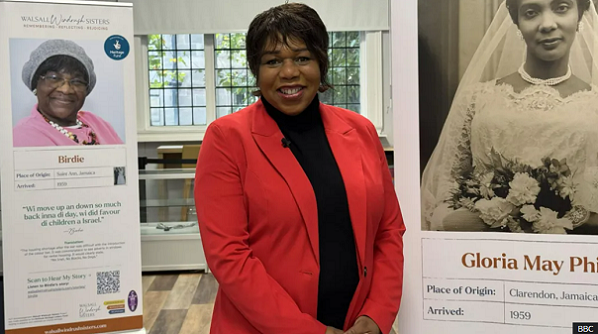

Ben Godfrey Walsall (BBC) reports on an exhibition on the Legacies of the Walsall’s Windrush Women, now on view at the Walsall Hub Library (on Lichfield Street, Walsall, UK). The items, photographs, and collection of oral histories in the exhibition have been collected and preserved by the Walsall Black Sisters Collective. Read the complete article at BBC News.
Their aim is for it to honour the sacrifices of African-Caribbean women while inspiring future generations to stand firm in their identity and pride.
Untold stories of African-Caribbean women who came to the Black Country during the Windrush era are being shared publicly for the first time – offering a poignant glimpse into lives marked by resilience, faith and quiet resistance. These women were among thousands who arrived in post-war Britain between 1948 and the early 1970s, invited to help rebuild a nation in ruins after World War Two. Yet, instead of welcome, many were met with hostility, racism, and systemic exclusion.
Their stories – long buried beneath the weight of silence – are now being preserved by the Walsall Black Sisters Collective, a charity that has supported local families for nearly 40 years.
The oral testimonies, now part of an exhibition at Walsall Hub Library on Lichfield Street, reveal the harsh realities faced by Windrush women.
The generation is named after HMT Empire Windrush, which docked in Tilbury, Essex, in 1948, bringing hundreds of passengers from the Caribbean to the UK and which was followed by further ships over the years until 1971.
Glenis Williams, project lead, described the barriers they encountered: “We have stories where families tried to find a home. It was made really difficult by the colour bar. “No blacks, no Irish, no dogs. We have a continuing story [from them] around finding work and actually being refused work because of their colour.”

Despite these obstacles, many told the charity they found strength in community and faith. Church became a sanctuary – a place to gather, to grieve and to grow. “They told us that going to church has been their backbone, their strength. And actually it shows resilience in how they have overcome barriers,” Ms Williams added.
Among the voices featured is Gloria May Phidd. For Gloria, Britain was a place of rich diversity, where friendships crossed colour and culture without labels. “Friends were simply friends—not Black, White or Indian,” she said. [. . .]
For full article, see https://www.bbc.com/news/articles/c781ed5lz1go
See more on the exhibition at https://www.walsallwindrushsisters.com/
[Photo above, BBC: 1) Glenis Williams said the exhibition showed the women’s resilience in overcoming barriers. 2) A portrait of Gloria May Phidd’s wedding party features in the exhibition.]
Ben Godfrey Walsall (BBC) reports on an exhibition on the Legacies of the Walsall’s Windrush Women, now on view at the Walsall Hub Library (on Lichfield Street, Walsall, UK). The items, photographs, and collection of oral histories in the exhibition have been collected and preserved by the Walsall Black Sisters Collective. Read the complete article at






